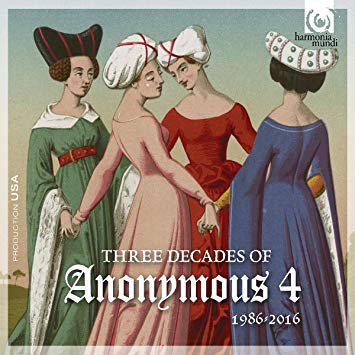Music |
Anonymous 4
By
Published: Oct 02, 2018
Category:
Classical
In the Middle Ages, women weren’t allowed to sing in public cathedrals.
As late as the 1980s, women weren’t performing medieval chant and polyphony.
In 1986, four women wondered what that music would sound like if men weren’t the singers.
They called themselves Anonymous 4, a pun on the name that referred to an anonymous English theorist of the late 13th century. But there was nothing unmemorable about them. Individually, they sang beautifully; together, they sang like angels.
In 1992, they recorded their first CD. By 1994, Anonymous 4 had three CDs in the top 15 on Billboard’s classical chart. From the beginning, it was clear: this quartet set the standard by which all other Early Music groups are measured. Over the next three decades, Anonymous 4 made 20 recordings produced and sold two million CDs — they were like rock stars.
A few years ago Ruth Cunningham, Marsha Genensky, Susan Hellauer, and Jacqueline Horner-Kwiatek called it quits. As a going away gift, they collected their favorites. If you’re new to their music, “Three Decades of Anonymous 4” is a good place to start. [To buy the CD from Amazon, click here.]
Like their concerts, their recordings were generally unified by a single theme: a saint, a feast day, a liturgical service, a manuscript, or a literary idea. Rather than blather on about musical issues that are vastly above my pay grade, let me suggest the obvious: listen.
English Ladymass
(To buy the MP3 download from Amazon, click here.)
La bele Marie – Songs to the Virgin from 13th Century France
{To buy the MP3 download from Amazon, click here.)
Four Centuries of Chant
(To buy the 2-disc CD from Amazon for $13.52, click here.)
This is music as meditation tool, prayer enabler, stress reducer, time travel, a drugless drug that intends to link us to the divine, and does. In times of high tension and great fear, it has the power to deliver an hour of peace. We owe these four women our deepest thanks.
BONUS
To read my piece on their recording of “The Origin of Fire – Music and Visions of Hildegard von Bingen,” click here.


